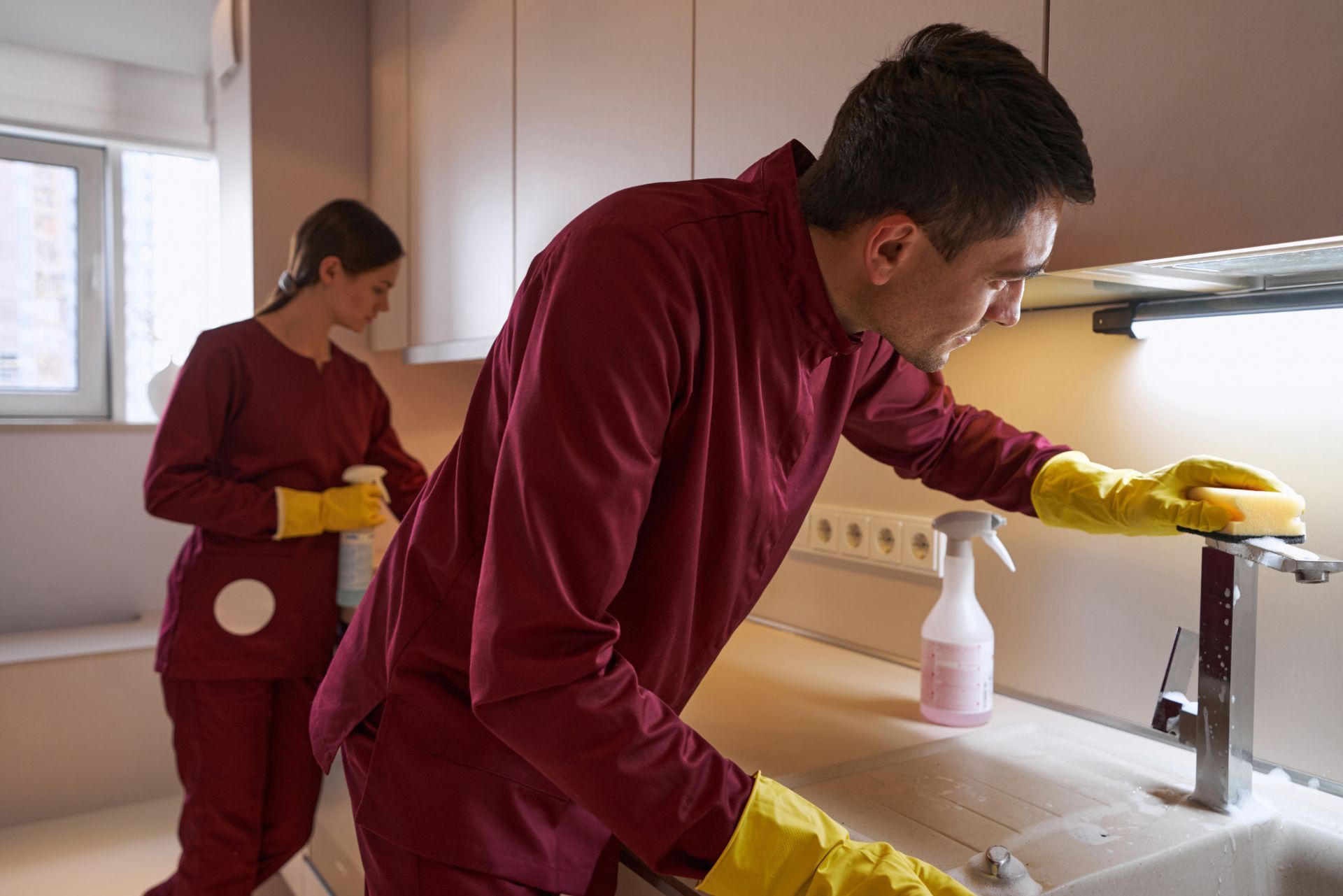Top 3 Recommended Policies

The janitorial services industry in New York is a bustling sector, integral to maintaining clean and safe environments across commercial, residential, and public spaces. With the U.S. janitorial services market valued at approximately $78.17 billion in 2023 and expected to grow steadily, businesses operating in this space face unique challenges and risks that make insurance not just advisable, but essential. Understanding the nuances of janitorial services insurance can protect your business from financial setbacks and help you maintain a solid reputation in a competitive market.
Whether you’re a small cleaning company or a large commercial janitorial service, this comprehensive guide will walk you through everything you need to know about insurance coverage tailored for janitorial businesses in New York.
Why Janitorial Services Insurance Is Crucial in New York
Janitorial services involve more than just cleaning floors and windows. They encompass managing a variety of risks, from slip-and-fall accidents to damage of client property. Without proper insurance, these risks can translate into costly lawsuits or financial losses that could jeopardize your business’s future.
According to Silverline Insurance, "Running a janitorial service involves more than just cleaning—it includes managing risks that can affect your business’s stability and reputation." This insight underscores the importance of having comprehensive insurance coverage that addresses common liabilities in this industry.
In New York, where regulations and client expectations are stringent, having the right insurance policies can also be a competitive advantage, reassuring clients that your business is professional and responsible.
Moreover, the diverse range of environments where janitorial services are provided—from corporate offices to healthcare facilities—means that the potential hazards can vary significantly. For instance, cleaning in a hospital setting not only requires a keen attention to sanitation but also involves the risk of exposure to hazardous materials or infectious diseases. Insurance tailored for janitorial services can provide coverage for these unique challenges, ensuring that your business is prepared for any situation that may arise.
Additionally, the financial implications of not having insurance can be devastating. A single incident, such as a slip-and-fall accident, could lead to claims that far exceed the cost of maintaining a robust insurance policy. This financial protection allows business owners to focus on growth and service quality rather than worrying about unforeseen liabilities. By investing in comprehensive insurance, janitorial services can safeguard their operations and enhance their reputation in a competitive market, ultimately leading to increased client trust and loyalty.

Types of Insurance Coverage for Janitorial Services
Janitorial businesses require a combination of insurance policies to cover the broad spectrum of risks they face. Here are the most common types of insurance essential for janitorial services in New York:
General Liability Insurance
This is the cornerstone of janitorial services insurance. It protects your business from claims related to bodily injury, property damage, and personal injury that occur during your operations. For example, if a client or visitor slips on a wet floor and sues your company, general liability insurance covers legal fees and settlements. Additionally, this policy can also extend to cover incidents that occur off-site, such as damage caused by your employees while cleaning a client’s property, ensuring that your business is safeguarded against unforeseen liabilities that could arise during service delivery.
Workers’ Compensation Insurance
Given the physical nature of janitorial work, injuries among employees are a significant risk. Workers’ compensation insurance covers medical expenses and lost wages for employees injured on the job. In New York, this coverage is mandatory for most businesses with employees. This insurance not only provides financial support to injured workers but also helps maintain a positive workplace environment by demonstrating a commitment to employee safety. Furthermore, having this coverage can enhance your company’s reputation, making it more appealing to potential clients who prioritize working with responsible and compliant service providers.
Commercial Auto Insurance
If your janitorial business uses vehicles to transport staff or equipment, commercial auto insurance is necessary. It covers accidents, damages, and liability related to business vehicles. This policy is crucial, as personal auto insurance may not cover incidents that occur while using a vehicle for business purposes. Moreover, commercial auto insurance can also provide coverage for non-owned vehicles used for business tasks, ensuring that your operations remain uninterrupted even if an employee uses their personal vehicle for work-related duties.
Property Insurance
This insurance protects your business property, including cleaning equipment and supplies, from damage or theft. It can also cover damage to client property in certain cases. Property insurance is vital for janitorial services, as the loss of specialized equipment can lead to significant operational delays and financial losses. Additionally, some policies may offer coverage for business interruption, which can help mitigate the financial impact of unforeseen events that disrupt your operations, such as natural disasters or vandalism.
Bonding and Crime Insurance
Many clients require janitorial companies to be bonded, which protects them against theft or dishonesty by employees.
Crime insurance can also cover losses from employee theft or fraud. Being bonded not only provides peace of mind to your clients but also serves as a testament to your business's credibility and integrity. This can be particularly important when bidding for contracts with larger organizations or government entities, as they often have stringent requirements for service providers. Additionally, crime insurance can help cover losses related to cybercrime, which is increasingly relevant in today’s digital landscape, ensuring that your business remains protected against a variety of potential threats.
Current Market Trends Impacting Janitorial Insurance Needs
The janitorial services market is evolving, and these changes directly influence insurance requirements and costs. The market was projected to reach $93.0 billion by 2024, with commercial cleaning services making up over two-thirds of this revenue, according to IBISWorld. This growth means more businesses are entering the space, increasing competition and the need for robust risk management strategies.
However, the industry is also facing challenges. A recent report by Vertical IQ noted a 7% year-over-year decline in total portfolio sales in the cleaning and hygiene market as of Q1 2025, signaling a market recalibration post-pandemic. This economic uncertainty has led janitorial businesses to monitor pricing pressures closely, which can affect insurance premiums and coverage decisions.
Additionally, labor shortages are a significant concern. Approximately 65% of janitorial companies report difficulty hiring qualified workers, as noted by WifiTalents. An aging workforce, with an average age of 42 years, further complicates this issue. These labor challenges increase the risk profile for insurers, potentially raising premiums or influencing coverage terms.
Moreover, the rise of technology in the janitorial sector is reshaping operational practices and insurance needs. Automation and advanced cleaning equipment, such as robotic cleaners and IoT-enabled devices, are becoming more common, enhancing efficiency and effectiveness. However, these innovations also introduce new risks, such as cyber liability and equipment malfunction, prompting insurers to adapt their policies to cover these emerging threats. As companies invest in technology to stay competitive, they must also consider how these advancements impact their overall risk management strategies.
Furthermore, sustainability is becoming a central theme in the janitorial industry. With increasing consumer awareness and demand for environmentally friendly practices, many janitorial services are adopting green cleaning products and sustainable methods. This shift not only appeals to eco-conscious clients but also influences insurance considerations, as companies may seek coverage that addresses environmental liabilities. Insurers are now evaluating how a company's commitment to sustainability can mitigate risks and potentially lower premiums, creating a new dynamic in the insurance landscape for janitorial services.
Incorporating Sustainability and Its Insurance Implications
Eco-friendly cleaning is becoming increasingly important in the janitorial industry. A 2025 study from WifiTalents found that 45% of janitorial businesses use eco-friendly products, reflecting growing demand for sustainable practices.
This shift towards green cleaning can influence insurance in several ways. Using environmentally safe products may reduce the risk of chemical-related injuries or environmental damage claims, potentially lowering liability risks. However, businesses must ensure that their insurance policies explicitly cover any new products or processes they adopt to avoid coverage gaps.
Moreover, some insurers offer incentives or specialized policies for businesses that demonstrate sustainable practices, which can be an added benefit for janitorial companies committed to eco-friendly operations.
In addition to liability considerations, the adoption of green cleaning methods can also enhance a company's reputation and attract environmentally conscious clients. As consumers increasingly prioritize sustainability, janitorial companies that embrace eco-friendly practices may find themselves at a competitive advantage. This shift not only aligns with consumer values but also opens up new market opportunities, allowing businesses to differentiate themselves in a crowded marketplace.
Furthermore, the integration of sustainable practices can lead to operational efficiencies that ultimately reduce costs. For instance, eco-friendly cleaning products often require less water and energy for effective use, which can translate into lower utility bills. By investing in sustainable cleaning technologies and training staff on green practices, janitorial companies can foster a culture of sustainability that resonates with both employees and clients, reinforcing their commitment to environmental stewardship while also improving their bottom line.

How to Choose the Right Insurance Provider in New York
Selecting the right insurance provider is critical to ensuring your janitorial business is adequately protected. Here are some tips for making the best choice:
- Industry Expertise: Look for insurers with experience in janitorial or cleaning services. They will better understand the unique risks and coverage needs of your business.
- Comprehensive Coverage Options: Ensure the provider offers all necessary policies, including general liability, workers’ compensation, and bonding.
- Competitive Pricing: While cost is important, don’t sacrifice coverage quality for lower premiums. Consider the insurer’s reputation and claims handling process.
- Customization: Your business may have specific risks depending on the types of clients you serve or the services you offer. Choose an insurer willing to tailor policies accordingly.
- Customer Support: Responsive and knowledgeable customer service can make a significant difference, especially when filing claims or updating coverage.
By partnering with a reputable insurance company, you can safeguard your janitorial business against unforeseen events and focus on growth and client satisfaction. Additionally, it’s beneficial to seek out reviews and testimonials from other business owners in your industry. They can provide insights into their experiences with various providers, which can help you gauge the reliability and service quality of potential insurers. Networking with local business associations or attending industry conferences can also yield valuable recommendations and connections.
Furthermore, consider the financial stability of the insurance provider. Check their ratings from independent agencies like A.M. Best or Standard & Poor's, as these ratings can give you a clearer picture of the insurer's ability to pay claims in the event of a disaster. A financially sound company is more likely to be around when you need them most, providing peace of mind as you navigate the complexities of running your janitorial business.
Conclusion: Protecting Your New York Janitorial Business for the Future
Operating a janitorial service in New York comes with a unique set of challenges and risks that demand careful attention to insurance coverage. With the market poised for growth but facing economic pressures and labor shortages, having the right insurance policies is more important than ever.
From general liability to workers’ compensation and commercial auto insurance, each coverage type plays a vital role in protecting your business assets, employees, and reputation. Staying informed about industry trends and incorporating sustainable practices can also influence your insurance needs and costs.
For janitorial businesses looking to navigate these complexities, consulting with experienced insurance providers and regularly reviewing your coverage can provide peace of mind and a competitive edge. As the janitorial services market continues to evolve, so too should your approach to risk management and insurance.
To learn more about the janitorial services market and its insurance implications, consider exploring detailed industry insights from
Grand View Research and
Vertical IQ.
Contact Us
Phone
Location
